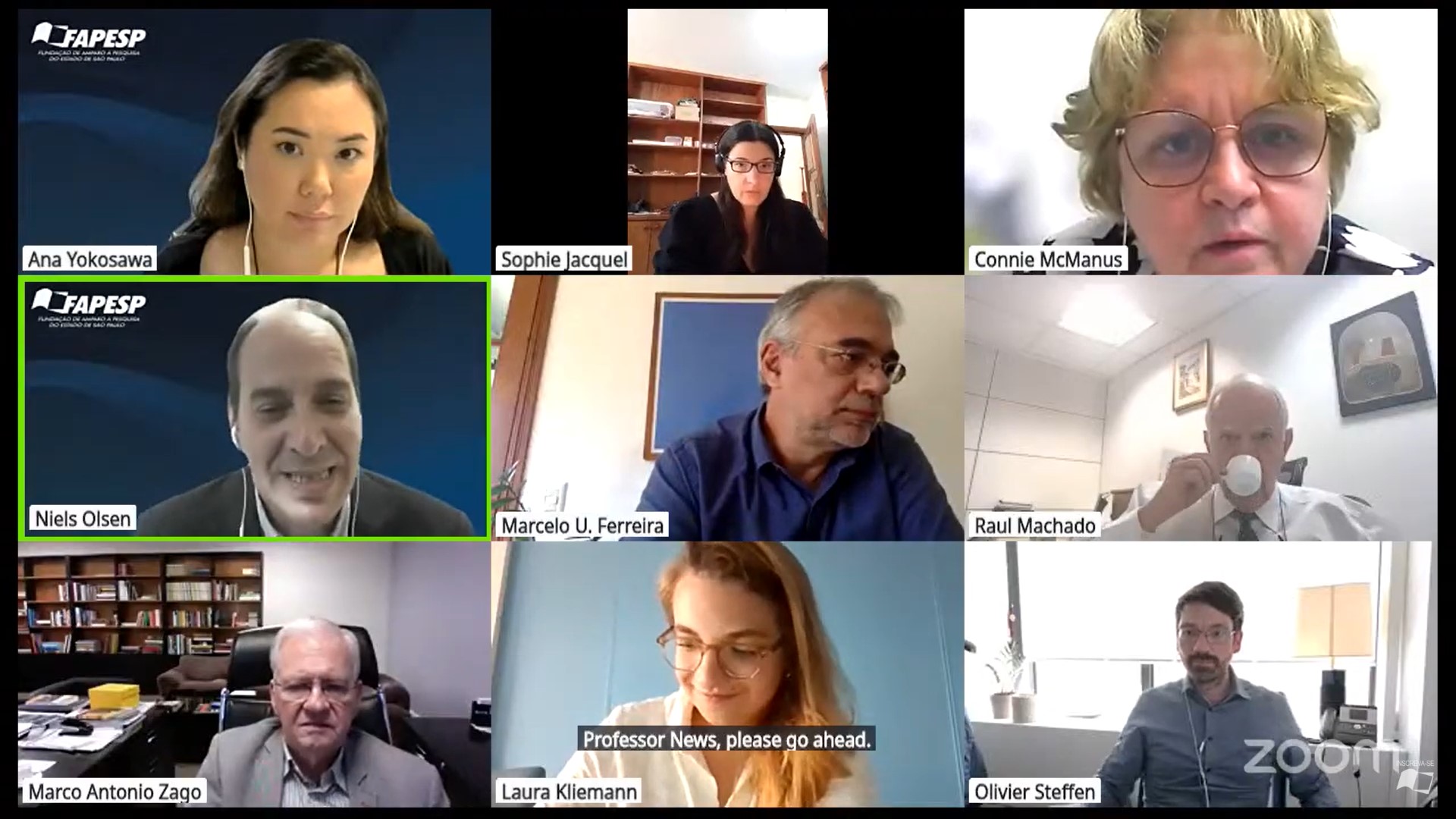

The webinar was held on May 19th (image: webinar screenshot)
Online event brought together leaders from the Foundation, the Institut National de la Santé et de la Recherche Médicale (INSERM), and the French Embassy in Brazil, as well as researchers.
Online event brought together leaders from the Foundation, the Institut National de la Santé et de la Recherche Médicale (INSERM), and the French Embassy in Brazil, as well as researchers.

The webinar was held on May 19th (image: webinar screenshot)
By André Julião | Agência FAPESP – Given the solid scientific collaborations that have taken place in recent years in several areas, FAPESP and French institutions wish to further strengthen their partnership. In a webinar held on May 19th, leaders from the Foundation, the Institut National de la Santé et de la Recherche Médicale (INSERM), and the French Embassy in Brazil, as well as researchers from São Paulo and France, discussed new possibilities for cooperation in human health research.
Marco Antonio Zago, the president of FAPESP, proposed three initial strategies to promote collaboration between researchers from France and São Paulo.
“FAPESP could provide complementary funds for ongoing Thematic Projects in the field of human health for those interested in establishing collaborations with one of INSERM’s groups,” he proposed.
The additional funds from FAPESP would cover the expenses of São Paulo researchers for the expansion of the project. Zago also suggested that FAPESP and INSERM focus on communication between research groups in São Paulo and France by sharing lists of human health research groups from São Paulo and the French institution. The idea is for researchers to seek out potential partners and submit joint proposals.
The next opportunity is in July, when FAPESP and the Agence Nationale de la Recherche (ANR) will launch another edition of their joint call, which they have held since 2011. As usual, research projects must be submitted to both agencies by a researcher from the state of São Paulo and one from France. In this model, each agency funds its own scientists.
“The idea is to discuss how we can generate collaborations between scientists from São Paulo and France. This is very important because we’re about to launch this new call, and INSERM is one of our partners. So it’d be great to be able to bring São Paulo and French scientists together to propose robust collaborative projects,” said Niels Olsen Saraiva Câmara, professor at the Biomedical Sciences Institute of the University of São Paulo (ICB-USP) and advisor to FAPESP’s Scientific Directorate.
Finally, the president of FAPESP proposed holding new online and in-person meetings in São Paulo and France to bring together researchers from the two scientific communities and organize their response to joint calls.
“Not just for the next call, but on a more general level, with a view to increasing collaboration,” he said.
Zago also recalled that another edition of FAPESP Week France will take place from June 10th to 18th, with the 10th and 11th dedicated mainly to cancer research, in Toulouse.
According to the president, São Paulo has contributed between 47% and 58% to collaborations between Brazil and France over the last five years. While the average impact factor (IF) of all publications from the state of São Paulo and France are 1.02 and 1.27, respectively, that of articles published in collaboration between São Paulo and France is 5.21, which represents a significantly higher number of citations.
Partnership
Olivier Steffen, the head of international relations at INSERM, recalled that Brazil is France’s largest scientific partner in Latin America. The two countries publish nearly 400 joint papers each year, the majority of which come from the state of São Paulo, “reflecting FAPESP’s prominent position.”
“We have a rich history of institutional partnerships with Brazil. FIOCRUZ [the Oswaldo Cruz Foundation, an agency linked to the Ministry of Health] is a historic partner, and we’re particularly happy to have recently signed an agreement with FAPESP through our infectious disease agency, INRS [Institut National de Recherche et de Sécurité],” he recalled. He also mentioned that around 600 Brazilian researchers are currently working in France.
Sophie Jacquel, counselor for science and technology at the French Embassy in Brazil, recalled the partnerships that led to the establishment of the International Research Center (IRC) of the Centre National de la Recherche Scientifique (CNRS) and the Institut Pasteur of São Paulo (IPSP), both of which are based at USP (read more at: agencia.fapesp.br/51330 and agencia.fapesp.br/51329).
“Cooperation with the state of São Paulo is key for us because of the excellence, the number of researchers, and the results that French institutions have in the state of São Paulo. It’s also important to work with you for a strong and coordinated state policy to support science in general and the health sciences in particular,” she said.
Marcelo Urbano Ferreira, a professor at ICB-USP, and Sylvie Garcia, a researcher at the Institut Pasteur, discussed the project they jointly approved in the most recent FAPESP-ANR call.
For the researchers, the combined expertise of different laboratories was key to getting the project approved. “In this type of call, you have to bear in mind that priorities can be different between funding agencies and what’s important for both countries,” Ferreira concluded.
Connie McManus, manager of Research Collaborations at FAPESP, Laura Kliemann, from INSERM’s Department of Partnerships and External Relations, and Ana Paula Yokosawa, deputy manager for Research Collaborations at FAPESP, also attended the event.
Previous FAPESP-ANR calls are available at: fapesp.br/6776.
Republish
The Agency FAPESP licenses news via Creative Commons (CC-BY-NC-ND) so that they can be republished free of charge and in a simple way by other digital or printed vehicles. Agência FAPESP must be credited as the source of the content being republished and the name of the reporter (if any) must be attributed. Using the HMTL button below allows compliance with these rules, detailed in Digital Republishing Policy FAPESP.





